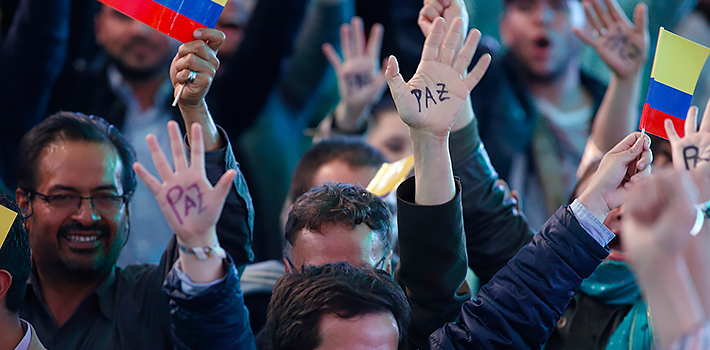
EspañolOn Sunday, President Juan Manuel Santos was reelected with nearly 51 percent of the vote, against the 45 percent obtained by his opponent, Óscar Iván Zuluaga. Despite a polarizing campaign season, a defeated Zuluaga accepted the result, once again demonstrating the strength of Colombian democracy.
Although this may be seen as something positive, the disadvantages of this political system, highlighted by authors like Alexis de Tocqueville or James Buchanan, are also in plain view.
Juan Manuel Santos retained the presidency thanks to the nearly 8 million Colombians who believe in the negotiated peace process with the Revolutionary Armed Forces of Colombia (FARC) and the National Liberation Army (ELN). Despite the costs and challenges that come with negotiating peace and with a post-conflict period, 25 percent — a significant portion of the electorate — hopes Santos can reach an agreement with the armed insurgent groups. If he is able to do so, then their vote will have been worth the trouble. Nothing could be better for Colombia after nearly six decades of violence!
Besides the enormous costs directly associated with the conflict, it has prevented Colombians from considering other priorities we have as a society, and these elections prove it. The president was reelected thanks to votes from the northern, coastal region of the country and the populist progressives. Under different circumstances, this would have generated some debate, since votes from the Colombian coast traditionally reflects the machinery of local political elites. Similarly, support from progressives would have been seen as unsustainable based on profound ideological differences with President Santos on the role of the state and Colombia’s social model.
But such debate never happened. The results of the election were received with joy by some and relief by others. Very few have delved into these issues, and those who have demonstrate a clear political agenda. What’s more, they base their criticism on practices that they themselves have used in the past.
After the euphoria subsides, the Santos administration in its second term will face several challenges in achieving credibility and legitimacy — not only to successfully conclude the peace process, but to be fully accepted by Colombians.
Despite the victory, Santos’s first challenge is a second term with very little political capital and practically alone. This is a result of a series of related events, beginning with the coalition of parties of the so-called National Unity — the Liberal Party, Radical Change, and the Party of the U — not having enough electoral strength to ensure victory by themselves.
Therefore, Santos had to ally himself with a segment of his main political opponents: populist progressives of the Democratic Pole. This group, however, has reiterated time and time again that they will shift their support back to the opposition once the next term begins.
Lastly, although they did not win, the other opposition segment, led by former President Álvaro Uribe Vélez, demonstrated that it is still a major political force and will surely become a much fiercer rival.
As a result of political isolation and weakness, Santos will have to do a good deal of juggling in order to pay the political debts incurred in the campaign. This means that during the next four years, Santos will likely be much more “generous” in distributing public resources. Apart from the votes received through the help of political leaders on the coast, and the positions in government that he will need to hand out in return, it should be noted that, during the last few weeks, the campaign resorted to seducing specific special interest groups.
The role that progressives will play moving forward deserves special attention. The more radical wing led by Senator Jorge Enrique Robledo, who promoted casting a blank vote, was defeated and captured no more than 5 percent of the electorate.
Populists led by Gustavo Petro and Clara López, however, did give their support to Santos in his reelection effort. It’s possible that they will not ask Santos for positions within the government, as they have said. It’s also possible that instead of cashing in their political favors in bureaucratic power, they may demand specific policy measures be taken that reverse the timid steps toward economic liberty that the country has recently taken.
In his second term, Juan Manuel Santos may actually accomplish his goal of making history. However, it’s possible that history will remember him as an example of the problems associated with an unlimited government and a democracy that does not abide by the will of the people. We can only hope that at the very least we get the signed peace agreement that we have all long desired. Perhaps then we can begin to address the many other crucial issues we face as a society.
 Versión Español
Versión Español












